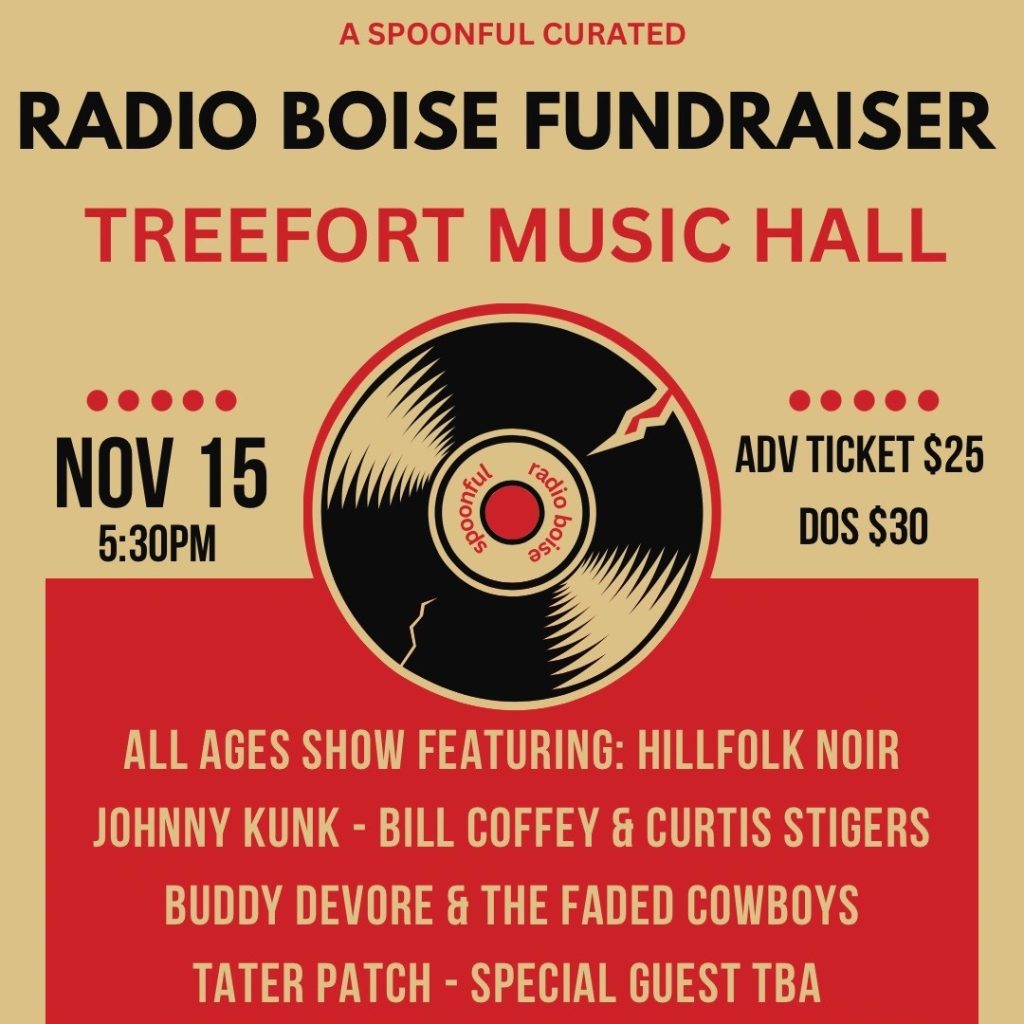
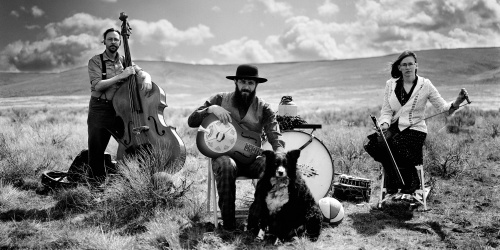
Hillfolk Noir
Built on more than 15 years of tradition, today’s Hillfolk takes their acoustic guitar, double bass, and “anything you can find at a hardware store” sound and integrates driving drums and an electrified sound, kicking down limitations to create a vibe that goes beyond their Americana “junkerdash” roots. Want to call it bluegrass’s trouble-making cousin? Fine by us. A bit of string-band blues? Sure ‘nuff. A concoction of electrified rockin’ soulful folksy witchcraft mayhem? Now you’re talking, mama. The indelible through-line is rooted in the band’s song craftsmanship. From mountains of frontman Travis Ward’s ragged, spiral-bound notebooks comes the hard and tender. They can blow the roof off the place or draw you around the fire with their earnest musical narratives of the back alleys, the open range, and the front porch. They paint with sound the earnest stories about the lives of lovers, law-breakers, and the lion-hearted. Heroes and outcasts alike. Hailing from Boise, Idaho, the always young-at-heart Hillfolk Noir has been carving their own musical path for 15 years. Grab a cup of juice and ease on down to enjoy these newfound Hillfolk vibes. “If John Steinbeck owned a speakeasy,” said John Doe (X, the Knitters), “Hillfolk Noir would be the house band.”
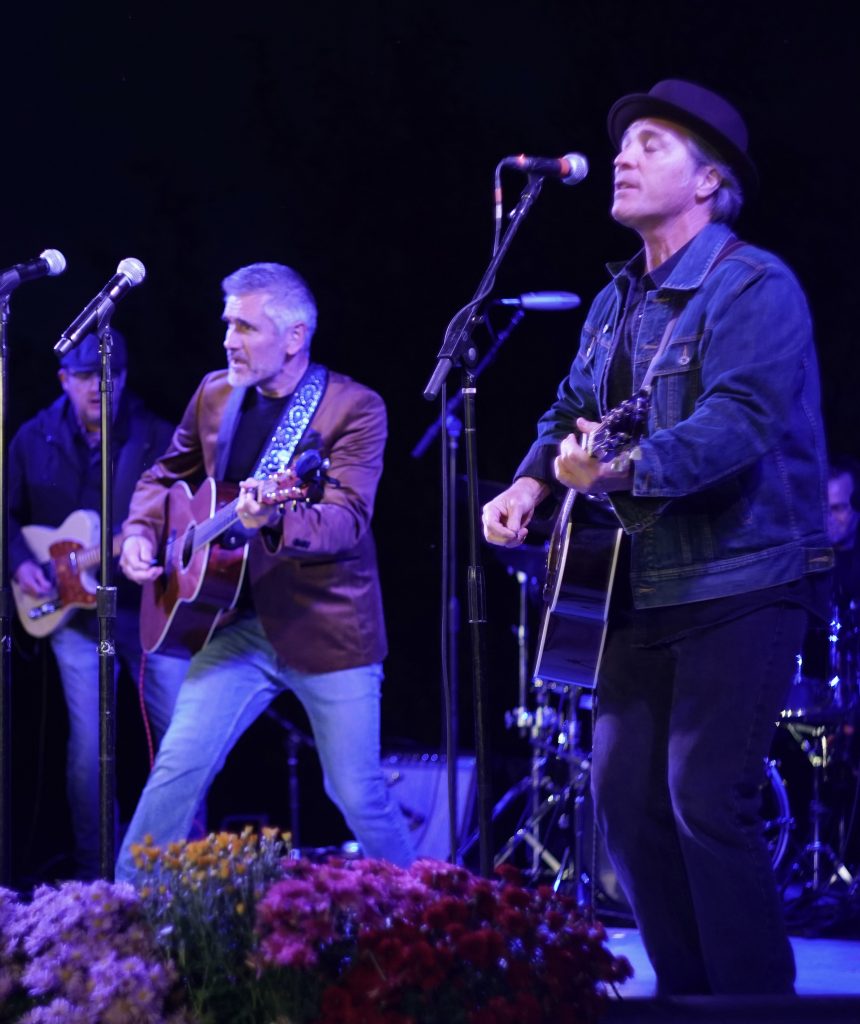
Bill Coffey & Curtis Stigers
Bill Coffey and Curtis Stigers met in downtown Boise nearly 20 years ago while waiting to pick up their kids from school, and they’ve been good friends ever since. They began playing music together soon thereafter at the Xtreme Holiday Xtravaganza in support of Interfaith Sanctuary Homeless Shelter, and at school fundraising house concerts. On occasion, they add guitarist Shaky Dave Manion, bassist and multi-instrumentalist Bernie Reilly, and drummer Casey Miller to the mix, and they often perform these house concerts while standing in front of the swimming pools of wealthy donors.
Thus: The Electric Poolboys!
Bill Coffey is a singer, songwriter, and guitar player who seamlessly melds the heartfelt storytelling of country with the raw emotion and energy of classic soul. His rich vocals and evocative lyrics are set against instrumentation firmly rooted in the traditions of American music, while his unique musical identity and stellar lineup of Boise-based musicians, affectionately known as His Cash Money Cousins, defy prevailing boundaries between genres. Born in Santa Monica, Bill Coffey spent his formative years playing psychedelic-tinged roots rock in southern and central California before eventually relocating to Idaho. As a solo artist and frontman for various bands, Bill has performed throughout the West and opened shows for a diverse list of artists from country legends Dwight Yoakam and George Jones to rock goddess Pat Benetar. Bill’s music has been featured in independent films, television, and on National Public Radio.
Singer/Songwriter/Saxophonist
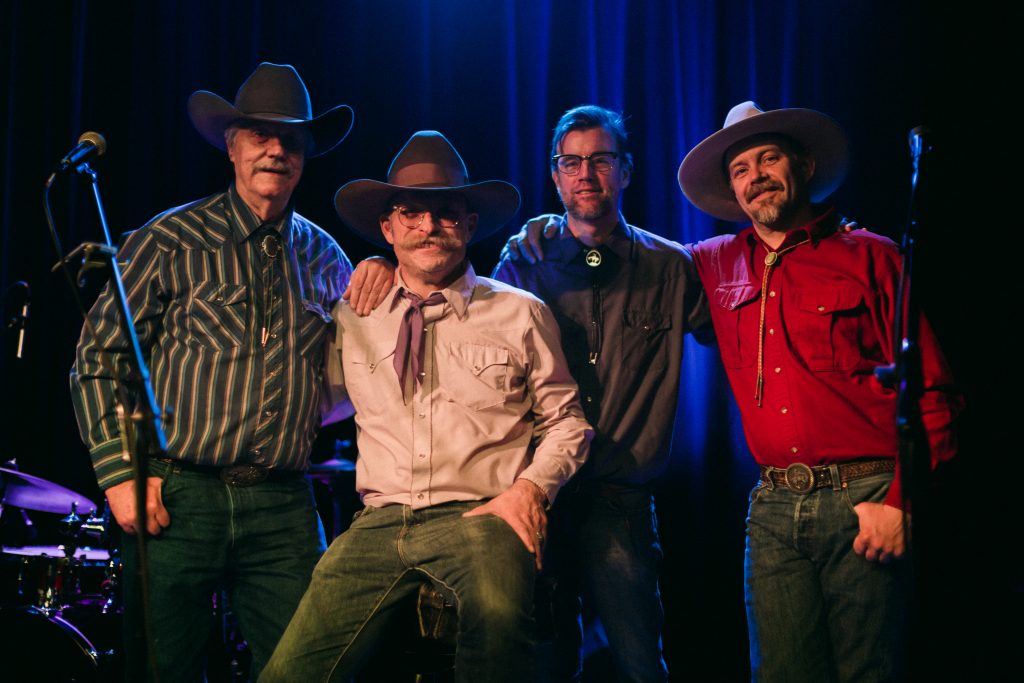
Buddy Devore & the Faded Cowboys
After spending 17 years as a professional cowboy throughout the western states, Buddy began to focus more seriously on his music about 15 years ago, and began playing professionally. In 2017, he brought together several other talented musicians from Southwest Idaho to form Buddy DeVore and the Faded Cowboys. With their energetic brand of Western Honky Tonk music, the band plays extensively at venues and festivals throughout the Mountain Northwest. The Faded Cowboys consist of Buddy DeVore – lead vocal and guitar, Bernie Reilly – upright bass, guitar and vocals, Louis McFarland – drums, Rob Matson – guitar and vocals, and Sam Rothwell – steel guitar. Their shows feature the best of classic traditional Country Music, as well as original material written by Buddy. The band released their first album, “Beautiful Day” in November, 2019, and just released their 2nd studio album “To Save A Miserable Hide” in September 2024.
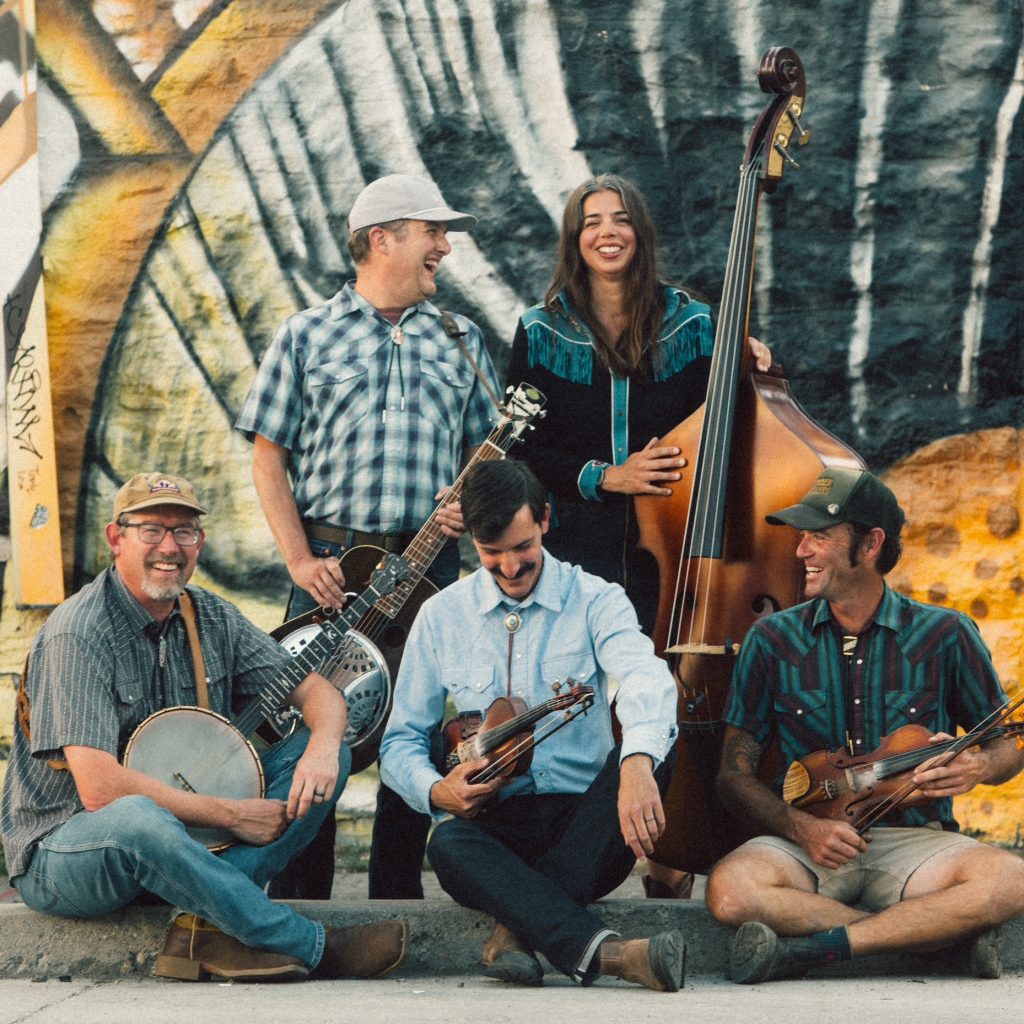
Tater Patch
Comprised of seasoned local pickers, Tater Patch delivers a unique sound combining the melodic drive of old-time music with the harmony vocal traditions of bluegrass. Featuring Dave Manion (dobro/guitar), Beth Mason (upright bass), Tate Mason (banjo), and a double fiddle attack from Justin Moore and Adam Straubinger, the band brings a raucous and frenetic energy to every performance.
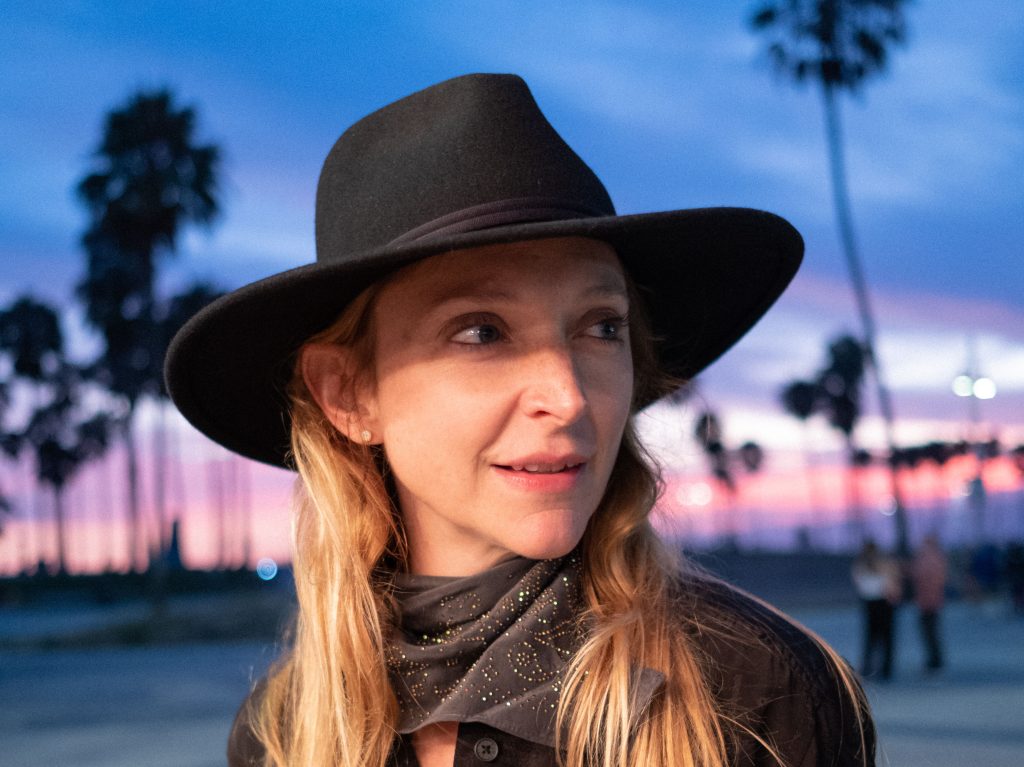
Eilen Jewell
“They say things have to get worse before they can get better,” Eilen Jewell reflects. “And for a while there, everything got worse.”
Indeed, in the span of just a few months, Jewell watched as her marriage, her band, and what felt like her entire career fell apart in a series of spectacular, heartbreaking implosions. By the time the dust had finally settled, the critically acclaimed singer and songwriter was grieving and shocked, living in a remote cabin in the mountains and unsure if she’d ever get to make music again.
“Up to that point, I’d just been going with the flow and letting outside forces dictate the path of my life,” Jewell explains. “Losing so much so fast forced me to figure out what really mattered. It made me realize that I’ve only got this one life, and I’d better get behind the wheel if I want to make the most of it.”
With Get Behind The Wheel, her ninth studio album, Jewell does precisely that, planting herself firmly in the driver’s seat as she picks up the pieces and finds new purpose and meaning in the process. Co-produced by multi-instrumental wizard Will Kimbrough (Todd Snider, Hayes Carll), the collection pushes Jewell’s trademark blend of vintage roots-noir into more psychedelic territory, with spacious, cinematic arrangements complementing her revelatory explorations of grief, loss, resilience, and redemption. The band’s performances are truly electrifying here, blending elements of early rock and rockabilly with old school country and soul, and Jewell’s delivery is timeless to match, her voice effortlessly moving from unguarded intimacy to icy cool and back, sometimes within the very same song. The result is Jewell’s boldest album yet, a powerful work of artistic alchemy that transforms heartache into genuine creative rebirth.
“I never wanted to make something that just wallowed in its misery because that’s not what I got from this whole experience,” Jewell says. “I’d be lying if I said it wasn’t tough, but I survived and I’ve come out so much stronger and more in tune with myself, and that’s the journey I wanted to capture in these songs.”
Hailed as “one of America’s most intriguing, creative, and idiosyncratic voices” by American Songwriter, Jewell built her career the old fashioned way, touring relentlessly with the kind of undeniable live show that converts the uninitiated into instant acolytes. Over the course of nearly two decades on the road, the Idaho native has crisscrossed the US, Europe, and Australia countless times, playing an endless series of headline and festival dates in addition to sharing bills with the likes of Lucinda Williams, Loretta Lynn, Mavis Staples, Wanda Jackson, George Jones, Emmylou Harris, and The Blind Boys of Alabama. Rolling Stone lauded Jewell’s “clever writing,” while NPR declared that she has a “sweet and clear voice with a killer instinct lurking beneath the shiny surface,” and The Washington Post mused that “if Neko Case, Madeleine Peyroux and Billie Holiday had a baby girl who grew up to front a rockabilly band, she’d probably sound a lot like Eilen Jewell.”
“From the outside, I’m sure everything looked very fun and exciting,” Jewell reflects, “but somewhere along the way I started to feel like I was stuck in a life that wasn’t my own, and I started drinking too much to escape all the stress.”
By the time the COVID-19 pandemic brought touring and recording to a grinding halt, things were nearing a breaking point at home, and Jewell and her husband of roughly a decade decided to call it quits.
“My husband was also my drummer and my manager,” Jewell explains, “so in one fell swoop, it felt like I’d lost everything.”
The untimely deaths of several close friends and family members followed shortly after, and Jewell soon found herself in the midst of a painful period of transition and self-examination. She left her home in Boise for a small cabin in the Idaho mountains, where she dove deep into meditation. She went for long hikes in the wilderness to stave off the constant threat of panic attacks, and she began experimenting with psychedelics in a search for clarity amidst the chaos.
“When I’m going through something big, I just instinctively start writing,” says Jewell, who began documenting her journey through lyrics and melodies. “I didn’t think I’d get to make another record, but I needed to write anyway just for the catharsis of it.”
The songs proved to be some of the finest, most arresting and emotionally nuanced writing of Jewell’s careers so far. Her ex-husband agreed
“He really loved the songs, too,” Jewell explains, “and he ultimately decided to stay with the band and come back on as my manager. We’ve always worked well together, and we co-parent really well, too, so when it was time to record, I think we were all just excited to get back to something that felt like normal.”
That excitement is palpable on Get Behind The Wheel, which opens with the slow-burning “Alive.” Raw and brooding, the track builds from a whisper to a gritty roar as it revels in the crucible-like quality of complete reinvention. “You gotta get behind the wheel / You gotta drive,” Jewell sings over blistering guitars. “Baby how you feel? / I feel so alive.” Like much of the album, the song grapples with a complicated swirl: longing, sadness, freedom, and fierce determination all churn just beneath the surface. The searing “Lethal Love” reckons with the dark side of romance, while the bittersweet “You Were A Friend Of Mine” contemplates loss and regret, and the soulful “Come Home Soon” finds new faith in the power of human connection.
“I used to think I was a natural hermit,” Jewell reflects, “but I had some really profound experiences with complete strangers over the past few years that made me realize how important the bonds we share with other people are. We’re all social creatures just trying to find home, and we need each other for that.”
Such revelations help keep the album from ever drifting too far into despair. The playful “Winnemucca,” for instance, embraces an openhearted joy. The instant classic “Crooked River” finds fervent hope in the possibility of a fresh start. The dreamy “Silver Wheels and Wings” sheds the trappings of the self to find buried spiritual treasure.
“I recently got engaged to someone I’ve known since I was a kid,” Jewell says, “and I think that’s a big part of the joyful element in this record. Sure, there’s a lot of heaviness and loss here, but there’s also a lot of hope and love and redemption, too. There’s a phoenix rising from the ashes.”
Things had to get worse before they could get better, and for Eilen Jewell, the best, it seems, is still to come.
